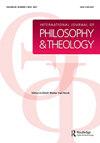通过海德格尔对伪善和Αλήθεια的描述来分析谢林《自由》中的恶
IF 0.3
0 PHILOSOPHY
International Journal of Philosophy and Theology
Pub Date : 2021-03-15
DOI:10.1080/21692327.2021.1919546
引用次数: 1
摘要
摘要本文分析了弗里德里希·W·J·谢林1809年的哲学著作《自由哲学》中的恶。谢林根据这两个原则对上帝的起源进行了阐述。这些原则是1)属于上帝的黑暗之地(邓克勒·格伦德)和2)上帝的自我启示,上帝实现了黑暗之地,这是上帝的先发基础。这两个原则本身也包含着人类世界的可能性和可理解性。为了阐明谢林关于恶的可能性的本体论解释,我转向马丁·海德格尔对谢林的《自由意志论》的分析,特别是海德格尔对自我意志的解释(Eigenwille),并将这些分析与海德格尔自己对αλõθεια的思考进行对话。我在谢林对黑暗之地的呈现(对他来说,黑暗之地是自我的基础)和海德格尔对隐藏的先验性的见解(Verborgenheit)之间建立了概念上的亲和力。本文章由计算机程序翻译,如有差异,请以英文原文为准。
Analysis of evil in Schelling’s Freiheitsschrift through Heidegger’s account of dissemblance and Αλήθεια
ABSTRACT In this paper, I offer an analysis of evil in Friedrich W. J. Schelling’s Philosophische Untersuchungen über das Wesen der menschlichen Freiheit (1809). Schelling develops an account of the sui-genesis of God out of the two principles. These principles are 1) the dark ground (dunkler Grund) that belongs to God and 2) the self-revelation of God, who actualizes the dark ground, which grounds God antecedently. These two principles also contain in themselves the possibility and the intelligibility of the human world. In order to elucidate the ontological account of the possibility of evil in Schelling, I turn to Martin Heidegger’s analyses of Schelling’s Freiheitsschrift and especially to Heidegger’s account of self-will (Eigenwille) and put these analyses in conversation with Heidegger’s own thinking about αλήθεια. I establish a conceptual affinity between Schelling’s presentation of the dark ground, which for him is the ground of selfhood, and Heidegger’s insights into the prioricity of concealment (Verborgenheit).
求助全文
通过发布文献求助,成功后即可免费获取论文全文。
去求助
来源期刊

International Journal of Philosophy and Theology
PHILOSOPHY-
CiteScore
0.30
自引率
0.00%
发文量
12
期刊介绍:
International Journal of Philosophy and Theology publishes scholarly articles and reviews that concern the intersection between philosophy and theology. It aims to stimulate the creative discussion between various traditions, for example the analytical and the continental traditions. Articles should exhibit high-level scholarship but should be readable for those coming from other philosophical traditions. Fields of interest are: philosophy, especially philosophy of religion, metaphysics, and philosophical ethics, and systematic theology, for example fundamental theology, dogmatic and moral theology. Contributions focusing on the history of these disciplines are also welcome, especially when they are relevant to contemporary discussions.
 求助内容:
求助内容: 应助结果提醒方式:
应助结果提醒方式:


